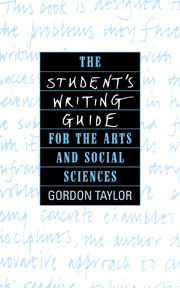Summary
How do I know what I think till I see what I say.
e. m. forsterHow do I know what I'll say till I see what I think.
anon.The main elements in academic writing
If we are to write well we need to know (as well as we can) what we are talking about. In order to find out what, precisely, we are talking about we need to write. Pushing ourselves to write will often reveal that we know more about a subject than we at first supposed; it should just as often reveal large gaps in our understanding of matters we thought ourselves fairly sure of. In writing we bring knowledge into being, we record and preserve it. Writing is the seed, the fruit and the pickle of our understanding.
Most people in the English-speaking world used to think that the student's and scholar's mind is an empty bucket to be filled by books, lectures and tutorials. Nowadays physiologists and psychologists tell us that the brain doesn't work in this passive, accepting matter. On the contrary, to learn and to write is, first, to make sense for ourselves of our new experience in terms of our old.
- Type
- Chapter
- Information
- Publisher: Cambridge University PressPrint publication year: 1989



